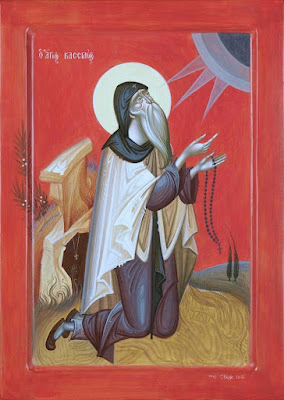THE FEAST OF ST. JOHN CASSIAN (JULY 23RD)
 |
| Contemporary Greek Icon of St. John Cassian |
Edited and Compiled by Bp. Joseph (Ancient Church of the West)
In the early centuries of Christendom, the life of St. John Cassian stands as a memorial to the growth and triumph of monasticism as a special calling to serve God with singleness of heart, godly wisdom and spiritual discipline. Born in AD 360 in the region of Scythia Minor, near the Black Sea, John was imbued with a profound love for God and an insatiable thirst for spiritual knowledge from a young age. His journey would lead him to become one of the most influential monastic writers in the Christian tradition.
As a young man, John Cassian, along with his close friend Germanus, traveled to Bethlehem where they entered a monastery to begin their ascetic training. However, their quest for deeper spiritual understanding soon led them to the deserts of Egypt, where they spent several years learning from the great Desert Fathers. These experiences profoundly shaped Cassian's spiritual outlook and his writings.
Cassian's travels took him to Constantinople, where he became a disciple of St. John Chrysostom. When Chrysostom was exiled in AD 404, Cassian went to Rome to advocate for his mentor, where he was ordained a deacon by Pope Innocent I. His journey continued to the south of France, where he established two monasteries in Marseille: one for men, dedicated to St. Victor, and one for women. These monasteries became centers of the monastic reform movement in the West, emphasizing the balance between communal and solitary monastic life. St. John was mindful of the maturity and age needed to lead a eremitical life, and thus advocated for the cenobitic (communal) monastic form of discipline.
St. John Cassian is best known for his written works, "The Institutes" and "The Conferences," which provided detailed guidelines for monastic life and spiritual practices. These texts drew upon the wisdom of the Desert Fathers and laid the foundation for Western monasticism. St. Benedict himself highly esteemed Cassian’s works, incorporating them into the Rule of St. Benedict, which became the cornerstone of Western monastic life and the axis for the growth and success of Western Civilization.
 |
| A Contemporary Icon Showing St. John Cassian Experiencing the Beatific Vision of Uncreated Light |
In his writings, Cassian addressed the spiritual struggles faced by monks and offered practical advice on overcoming the eight principal vices, later refined into the seven deadly sins. His teachings emphasized the importance of purity of heart, humility, and the continuous quest for God. His works have guided countless monks and laypeople in their spiritual journeys, offering a path to deeper communion with God.
St. John Cassian's contributions to the Church extended beyond his writings. His life exemplified the virtues of humility, obedience, and fervent prayer. His monasteries in Marseille became models of monastic piety and discipline, attracting many who sought to dedicate their lives to God.
St. John Cassian departed this life around AD 435, leaving behind a legacy that would endure through the ages. He is venerated as a saint in both the Eastern and Western Churches, and his feast day is celebrated on July 23rd in the West and on February 28th in the East.
COLLECT
O GOD, who by Thy grace didst call Thy servant John Cassian to preach the Gospel and to guide the monastic life: Grant that we, following his example and teachings, may renounce ourselves, and ever walk in Thy ways; through Jesus Christ our Lord, who liveth and reigneth with Thee and the Holy Ghost, ever one God, world without end. Amen.


Comments
Post a Comment